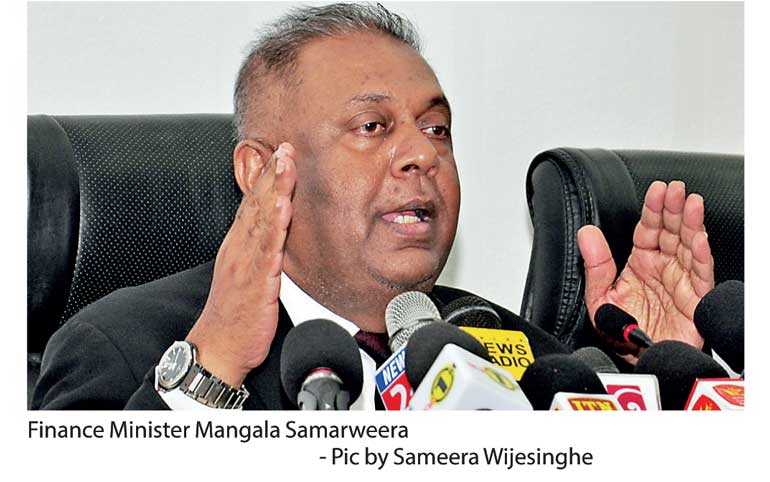Friday Feb 27, 2026
Friday Feb 27, 2026
Wednesday, 20 June 2018 00:00 - - {{hitsCtrl.values.hits}}

By Charumini de Silva
Finance Minister Mangala Samaraweera yesterday announced broad revisions of health sector taxes including the removal of 15% Value Added Tax (VAT) on doctors’ consultation fees, channeling fees and professional charges, which will be implemented from 1 July.
Cabinet approval was given after Health Minister Dr. Rajitha Senaratne presented a Cabinet paper on the instruction of President Maithripala Sirisena and Prime Minister Ranil Wickremesinghe.
“We realised that the 15% VAT imposed on these medical fees was putting an undue pressure on the general public. As a sensitive Government, we decided to remove these taxes charged from 1 July. However, the VAT charged on private hospital rooms will remain unchanged because we think that those who opt to stay can afford it,” Samaraweera told reporters. He also pledged to increase the fund allocation for the health sector to 5% of GDP in the 2020 Budget.
In addition, he said the ministry would increase the current Rs. 35,000 Disturbance, Availability and Transport (DAT) allowance given to doctors in the near future. However, a specific amount is yet to be decided upon.
Noting that the ministry made several tax adjustments last month, including authors’ royalty fees and children’s savings accounts, Samaraweera said all of these tax revisions would be presented before Parliament during this month for them to be passed into law.
According to the Minister the estimated loss of income to state coffers as a result of these tax revisions amounted to around Rs. 1.2 billion per annum. Nevertheless, he was confident that the Government would be in a position to achieve the set target of Rs. 30 billion by year-end.
It was pointed out that the 69,000 new tax files have been opened during the past two months alone, which is an increase of 15% compared to the 400,000 total tax files that were opened before.
The Minister called on all professionals including doctors, lawyers, architects, tuition masters and others to pay their due taxes, insisting that 82% was collected as indirect taxes.
Deputy Treasury Secretary S.R. Attygalle said during the first five months the provisional total revenue (all inclusive) collected from January to May this year amounts to Rs. 775 billion compared to Rs. 740 billion in the same period last year, recording an increase of 5%.
He stressed that there was a month-to-month increase of Rs. 5 billion in the income taxes collected by the Government in May compared to the same period in 2017. When asked if he was confident in achieving the Budget deficit target for this year, Samaraweera said that they were working towards it.
“I admit that even if the growth targets weren’t the ones we’d like to have seen due to the floods and drought experienced last year, our economy is doing well. Exports have increased, FDIs are more compared to a few years back and the unemployment rate has reduced. There are good signs on the horizon but we have to work hard to maintain and keep up the momentum,” Samaraweera stressed.
Nevertheless, the Minister was optimistic of achieving an economic growth of 4.5% to 5% for this year.
Inland Revenue Department (IRD) Commissioner General Ivan Dissanayake said total taxes collected by IRD from 1 January to 13 June amounted to Rs. 276.7 billion compared to the Rs. 256 billion collected in the corresponding period last year, recording an increase of 8%.
Referring to the top marginal income tax in selected emerging markets, the Minister said Sri Lanka’s 24% was very fair compared to other countries such as India (35%), China (45%), Thailand (35%), Indonesia (30%), Bangladesh (30%) and Malaysia (28%).